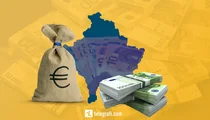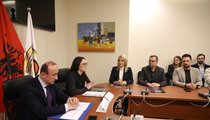Sejko: Unemployment was reduced by 7% while the debt from 72% to 56% of GDP!
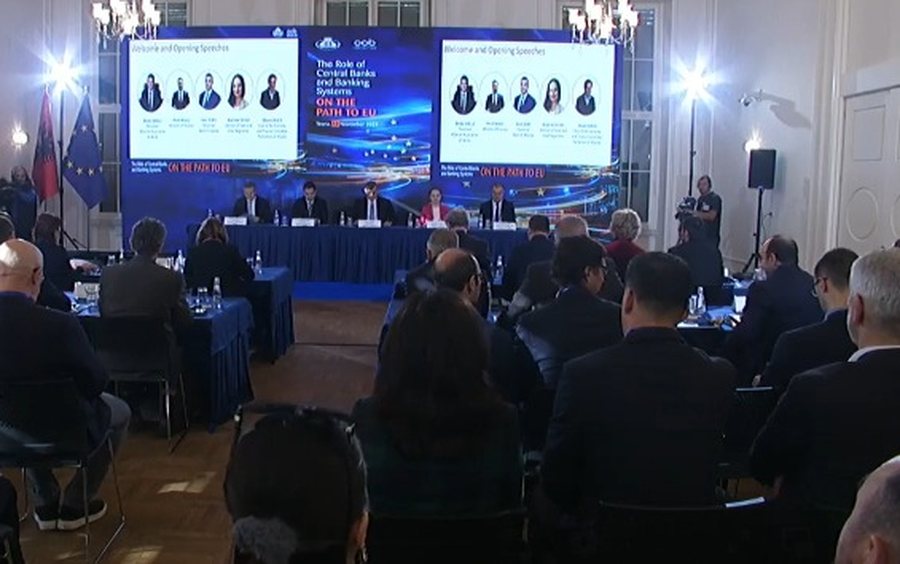
The topic of the conference that took place today in Tirana, by the Bank of Albania in cooperation with the Albanian Association of Banks was "The role of the central bank and the banking system on the road to the EU".
Present at this conference were the Governor of the Bank of Albania, Gent Sejko; The Chairman of the Albanian Association of Banks, Bledar Shella, the Chairman of the Economy and Finance Commission, Eduard Shalsi, the Minister of State and Chief Negotiator Majlinda Dhuka, the Minister of Finance, Petrit Malaj, as well as other guests from the relevant institutions.
In the speech delivered at this meeting, the Governor of the Bank of Albania, Sejko, said that the Bank of Albania is an integral part of the country's EU integration process, in 5 chapters.
Sejko said that, "the integration process also means an increasing exposure to financial flows in the form of portfolio investments. These flows serve the development of the financial market and reduce the overall costs of financing in the country. In this context, we judge that the current regulatory framework and that of the monetary policy offer a good starting point for addressing them".
Focusing on the development of the economy, Sejko stated that, "Albania of 2024 offers a completely different economic reality compared to a decade ago, when the country received the status of a candidate for membership. The volume of economic activity in the country has increased from 10 to 24 billion euros, the unemployment rate has been reduced from 17.5% to 10.7%, and the average annual income per capita has increased from 3500 to 9200 euros.
According to him, "inflation has recorded an average level of 2.5% during this period, the current account deficit has decreased from almost 11% to 2% of GDP, foreign debt has been reduced from 70% to 44% of GDP , while public debt has decreased from 72% to 56% of GDP. In parallel with them, the banking sector has shown stability and improving financial indicators. Thus, the ratio of non-performing loans has decreased from almost 23% to 4.6%, the capital adequacy ratio has reached an average level of 18%, while the banking sector has continued to lend to the economy and display high levels of liquidity and profitability.
The conference will be organized in three sessions, where the main topics of the talks will focus on the opening of the green light and the beginning in October of the official process of negotiations for membership in the European Union, as well as the role that central banks have in the integration process and the banking sector.
The speech of the President of the Albanian Association of Banks, Mr. Bledar Shella, at the conference of the Bank of Albania and the Albanian Association of Banks.
Dear Minister of Finance, Mr. Malaj,
Dear Mrs. Chief Negotiator, Mrs. Dhuka,
Dear Governor of the Bank of Albania, Mr. Seiko,
Dear Chairman of the Committee for Economy and Finance, Mr. Shalsi,
Dear guests and colleagues,
Ladies and Gentlemen.
There is a historical difference this time our sitting in this hall of this conference. Never before have we been so close as now to that part of civilization, avant-garde economy and free society where our geographical position has placed us.
It is this moment that gives this conference special value and increases our interest to the maximum. The challenge is political, social, administrative and economic.
With these in mind and as a priority of our work, we agreed with the Bank of Albania to organize this conference in order to present our main challenges. The banking industry is part of the economy and many things will go hand in hand. But it also has its own peculiarities. Starting with monetary policy, with supervision, with the legal side, with international financial reporting standards, with deposit insurance, with extraordinary intervention and with the payment system. Banking activity, which for several years, in fact, has been adapting to regulatory changes in accordance with EU standards, does not come to this empty territory. Now our attitudes and opposition to changes are completely guided by the fact whether these changes are in line with EU standards or not. This has made us experience the burden of the load and responsibility more quickly to go to this process without resistance, but with desire, energy and faith.
We are fully aware that the challenge of integrating the banking industry through the completion and implementation of the legal and regulatory framework of the EU and its institutions requires the involvement of all of us - the government, the legislator, the Bank of Albania, the Deposit Insurance Agency, Personal Data Protection, Financial Intelligence Unit, and banks. The more harmonized these institutions are and the more involved we market actors are, the better it will be for the reforms that await us.
Now there is no more time. Perhaps a few years ago, we were the ones who asked the authorities for more patience and postponement of the deadlines for the implementation of the standards as long as an imminent EU membership date was not in sight. Today we speak differently. Because we have a defined time horizon - the year 2030. And in this time frame, the banking industry cannot fail to be a contributing, supporting and implementing part of the reforms that await us.
We have just successfully closed Open Banking, all in compliance with PSD2. Now we await the decision to be part of SEPA. Digitalization, implementing strict requirements for cyber security and personal data protection, has included every aspect of banking activity - from onboarding, electronic signature, services, utility payments, payments for public services, account control, exchanges, etc. ., all in one smartphone. Aware that we still have to do for financial inclusion, even though with the law on the basic account, there is already a product to attract more citizens to the bank.
The banking industry is at a very good moment in its development. Only for the 9th month of this year, the banking sector has provided about 281 billion ALL in loans to the economy, an increase of 30% compared to the same period last year. The NPL ratio fell to 4.58%, the lowest level in the last 16 years. Annual growth of deposits 4.1%. 63% of the number of payments are made through electronic channels. Even the total value of payments in these channels has increased to 41%. 34% of active bank accounts are accessible from the Internet.
Without delving further into more detailed analysis, let me emphasize that we live in a time where developments are dynamic and things are constantly changing. Our interest is maximum in how the deadlines for completing the MREL for systemic banks will be handled, when we will have a new law for the central bank and second-tier banks, how the deposit insurance scheme can be changed, and when we are ready for instant payments.
These and more are on our list of tasks and requests in order to meet deadlines. With our united and unified voice, we will continue to demand that the reforms are better understood, clearly written and implemented.
Although the adaptation of the required legislation is almost determined by EU directives, our role is still indispensable. The new standards must be well understood, there is a need for education and training of the staff who will implement them, but there is also a need for public education to understand them. Starting with PSD2 and SEPA and continuing for others. As AAB, it is up to us to be at the head of this process by treating them with priority according to the agenda.
The role of the banking industry and its contribution to the development of the economy is indisputable. We are proud that, after going through the consequences of the crisis of 2008-2010 and those of 2019 and back (earthquake, pandemic, war in Ukraine, inflation), the banking industry turned out to be empowered, well-capitalized according to the requirements of the Bank of Albania, with growth of lending activity, more public trust in banks, more digitization and more openness to the public. We must strengthen and improve this positive trend during the reform process that unites us with the EU.
Believing and optimistic about facing the challenges that await us, I wish the conference a lot of success!
Thank you!
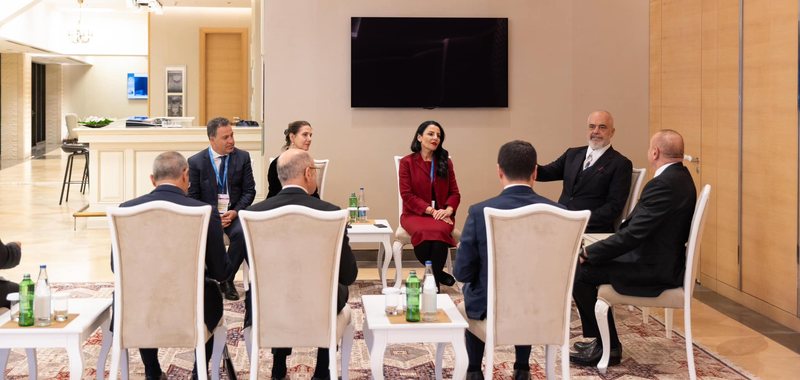
The Albanian-Arab company for securities is created - How will it work and what will it be responsible for?
The Albanian government and the United Arab Emirates are creating a joint public securities printing company. The news was given by Prime Minister Edi Rama......
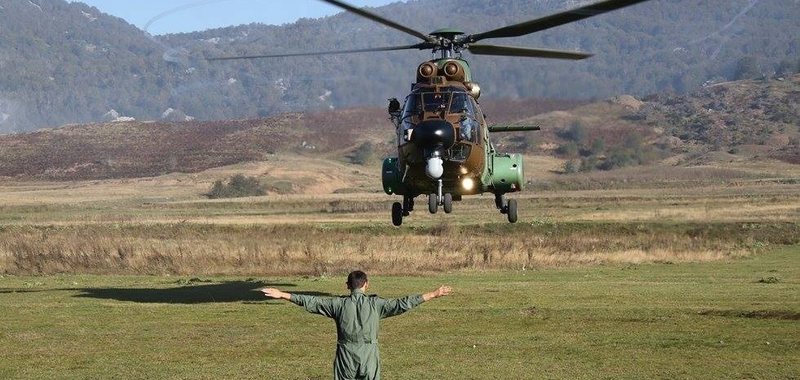
Kosovo pilots train at the Farka Air Base - Albania-Kosovo cooperation to increase security
The Ministry of Defense announces that it is focusing on cooperation for increasing the level of human capacities with Kosovo. Therefore, in addition to the......

Elon Musk will be Trump's "scissors" - Appointed to head the Department of Efficiency
President-elect Donald Trump named Elon Musk to head the Department of Efficiency, a new agency that will focus on cutting red tape, spending and excessive......

Project details/ How will Korca be gasified? - Document: 13.3 million euros must be invested by residents
Albgaz and SOCAR of Azerbaijan will start the implementation of the Korca gasification project in a few months. The project, which is expected to start in......

What is proposed for local government? - Haxhimali: We requested an increase in the budget from 5-10%
The Ministry of Finance and Economy has presented us with a project - budget for the local government for the year 2025 as follows: For the year 2025, the......

Bitcoin breaks record - Increases to 90 thousand dollars with the support of the Trump administration!
Bitcoin rallied to the $90,000 mark on Tuesday, riding a wave of euphoria since the election of Donald Trump as US president on expectations that his......
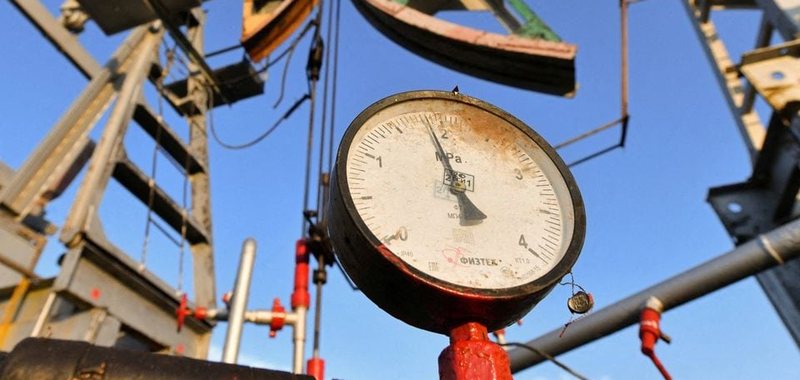
Oil prices fall as Trump signals increased support for more drilling
President-elect Donald Trump's vocal support for more US drilling has contributed to volatile oil prices, with crude prices down 4.83% this week to $68.4 a......
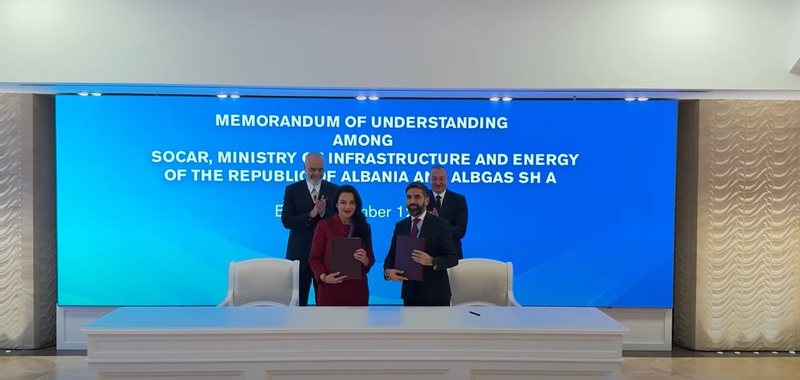
The agreement for the gasification of Korça - Balluku is signed: The project will start in 2025 and be delivered in 2027
Prime Minister Edi Rama and Deputy Prime Minister, at the same time Minister of Infrastructure and Energy, Belinda Balluku met in Baku with the President of......






